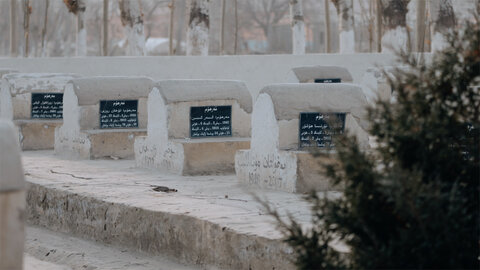Hawzah News Agency - (Yakruyk - China) - "I cannot find my grandfather's grave," said Sadir Yasin, standing in the midst of an undulating graveyard riddled with crevices. It's been several years since Yasin and his parents stood across the street of the deserted slope to talk to their deceased loved one. "I was 10 years old when my grandfather passed away in 2010. Back then, I would come here with my family to visit my grandfather's grave, but a couple of years later, we could no longer find it," Yasin told us.
He's not alone in the village of Yakruyk, near Uqturpan – a county under southern Xinjiang's Aksu Prefecture and only 70 kilometers from China's border with Kyrgyzstan.
Numerous grave mounds pile in heaps across the small slope, exposed to the scathing sun, floodwaters, and arid winds from the Taklamakan and overgrown ruderals. In addition, Uygurs, especially those who were living in impoverished rural areas, didn't have the custom of erecting tombstones. Instead, they would stick a small branch on top of a mound to mark it. Over time, these branches would go missing, and they wouldn't be able to locate the graves of their relatives.
"It's hard for villagers to find their departed families buried in this ground, which has a history of over a century," said Mexmut Toxti, an official of Yakruyk Village, adding that the area has become disorderly and unsightly after years of exposure to the harsh natural environment, so that no one wants to put their departed family members here.
This rundown burial ground is one of the 2,728 old cemeteries distributed throughout the prefecture of Aksu. A number of residents worried that they couldn't find their family's graves and had complained to local officials seeking help to improve the environment of the grave sites.
"We started planning environmentally-friendly cemeteries here in Uqturpan back in 2005, at the request of over 95 percent of local residents who have their families buried on such dilapidated slopes," Halmurat Ismail, head of the county's civil affairs bureau, told us. It took a decade to finish building 99 eco-friendly cemeteries across 108 villages, many of them perched next to the old graveyards for convenient relocation of the graves.
Yasin has had more fortunate neighbors who had been able to identify the grave of their families and relocated them from such dirt mounds to new cemeteries with tombstones on them.
"Some of the families that didn't have money when a member passed away wouldn't be able to spend up to 3,000 yuan to hire someone to dig a grave, but now farmers are able to accept paying 1,000 yuan to employ one," observed Mexmut Nur, who's in charge of the funeral industry in Yakruyk.

